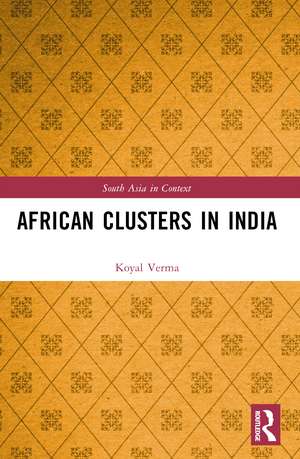African Clusters in India: South Asia in Context
Autor Koyal Vermaen Limba Engleză Paperback – 9 oct 2024
This monograph argues that the antagonistic urban environment gives rise to the formation of a pan-African identity as a response to cultural biases and stereotypes. Thus, it explores the role of language, culture, and politics of representation to show the process of ‘othering’ and exclusion in India.
Drawing on lived experiences of the migrants, the volume engages with the larger discourse of globalization, liberalization, and migration within the global south. It will be of great interest to scholars and researchers of critical race theory, ethnography, urban sociology, African studies, and South Asian studies.
| Toate formatele și edițiile | Preț | Express |
|---|---|---|
| Paperback (1) | 257.32 lei 6-8 săpt. | |
| Taylor & Francis – 9 oct 2024 | 257.32 lei 6-8 săpt. | |
| Hardback (1) | 866.62 lei 3-5 săpt. | +21.56 lei 4-10 zile |
| Taylor & Francis – 23 mar 2023 | 866.62 lei 3-5 săpt. | +21.56 lei 4-10 zile |
Preț: 257.32 lei
Preț vechi: 310.03 lei
-17% Nou
Puncte Express: 386
Preț estimativ în valută:
49.28€ • 50.77$ • 41.28£
49.28€ • 50.77$ • 41.28£
Carte tipărită la comandă
Livrare economică 24 februarie-10 martie
Preluare comenzi: 021 569.72.76
Specificații
ISBN-13: 9781032233345
ISBN-10: 1032233346
Pagini: 174
Dimensiuni: 156 x 234 mm
Greutate: 0.32 kg
Ediția:1
Editura: Taylor & Francis
Colecția Routledge India
Seria South Asia in Context
Locul publicării:Oxford, United Kingdom
ISBN-10: 1032233346
Pagini: 174
Dimensiuni: 156 x 234 mm
Greutate: 0.32 kg
Ediția:1
Editura: Taylor & Francis
Colecția Routledge India
Seria South Asia in Context
Locul publicării:Oxford, United Kingdom
Public țintă
Academic and PostgraduateCuprins
Preface
Acknowledgments
List of Acronyms
PART I
Introduction
1 ‘African Clusters,’ Spatial Exclusion, and ‘African’ Identity in India
PART II
The Emergence of African Clusters in India
2 India-Africa Relations: Delineating Post-colonial and Neoliberal Ties in Global South
3 Historical and Contemporary Patterns of Migration from Africa to India
4 The Forced Migration of Somali Refugees: Mapping the Impacts of Civil War and Internal Political Crisis
5 Re-reading ‘African’ Clusters: Locating Housing Segregation, Gated Communities, and Discriminatory Practices
PART III
Race, Representation, and Othering: Lived Experiences from the African Cluster
6 African Migrants and Discrimination: Locating the Intersectionality of Race, Class, Gender, and Religion
7 African Migrants, the State, and Contesting Narratives on Racial Discrimination: Locating Critical Race Theory
8 Discursive Representation and Othering of the African Identity: Race as a Signifier
9 The Pan-African Identity in India: The Emergence of Collective Identity through Solidarity Networks and African Kitchens
PART IV
The Way Forward
10 De-colonizing Colour Consciousness: Theorzing Race and Racism in India
Index
Acknowledgments
List of Acronyms
PART I
Introduction
1 ‘African Clusters,’ Spatial Exclusion, and ‘African’ Identity in India
PART II
The Emergence of African Clusters in India
2 India-Africa Relations: Delineating Post-colonial and Neoliberal Ties in Global South
3 Historical and Contemporary Patterns of Migration from Africa to India
4 The Forced Migration of Somali Refugees: Mapping the Impacts of Civil War and Internal Political Crisis
5 Re-reading ‘African’ Clusters: Locating Housing Segregation, Gated Communities, and Discriminatory Practices
PART III
Race, Representation, and Othering: Lived Experiences from the African Cluster
6 African Migrants and Discrimination: Locating the Intersectionality of Race, Class, Gender, and Religion
7 African Migrants, the State, and Contesting Narratives on Racial Discrimination: Locating Critical Race Theory
8 Discursive Representation and Othering of the African Identity: Race as a Signifier
9 The Pan-African Identity in India: The Emergence of Collective Identity through Solidarity Networks and African Kitchens
PART IV
The Way Forward
10 De-colonizing Colour Consciousness: Theorzing Race and Racism in India
Index
Notă biografică
Koyal Verma is currently working as an Assistant Professor at the School of Liberal Arts, Bennett University. She has taught at Delhi University in colleges like Miranda House, Hindu College, and Maitreyi College, as well as Ambedkar University Delhi and Jawaharlal Nehru University. She has done research for projects funded by Yale University, UNESCO, Ford Foundation, Jawaharlal Nehru University, and United Nations Population Fund (UNFPA). Her areas of specialization are urban sociology, migration studies, diaspora studies, and race and ethnic studies.
Descriere
This book examines the discrimination and stereotypes faced by the African migrants in India. It outlines the narratives of the migrants and demonstrates how their ‘African identity’ gets associated with drugs, prostitution, and cannibalism.



